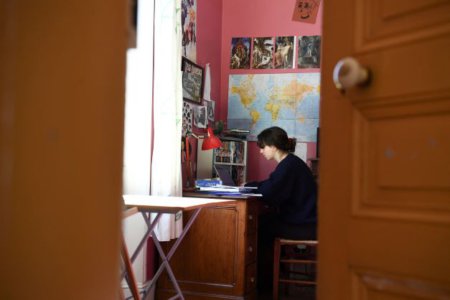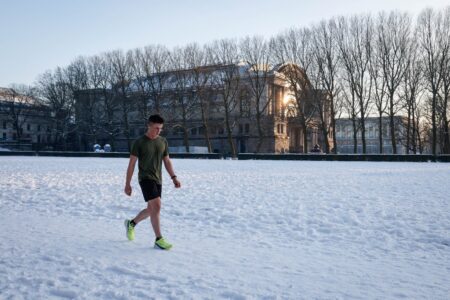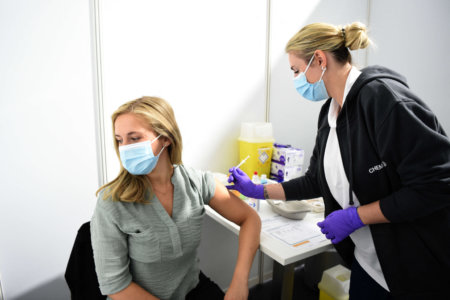
Russia has plans to welcome 500,000 international students by 2030, and 2024’s results are working positive towards that achievement.
Last year, the country welcomed a record-breaking 389,000 international students, with a noticeable increase in the number of students from Africa, Latin America, India, and the Middle East. The number of Indian students continues to grow as well, primarily studying medical specialities.
But why are so many international students eager to head to Russia despite the country’s political turmoil?

Despite the ongoing conflict with Ukraine international students continue to choose to study in Russia. Why? Source: AFP
Why study in Russia?
You may question the idea of studying in Russia, especially when the country has received negative publicity emanating from its invasion of Ukraine. The unprovoked and premeditated war has led to the deaths of thousands of people, and many have chosen to flee or seek refuge in other countries.
But despite that, many are willing to put aside prejudice, and political views – and maybe even personal values? – for affordable, high-quality education in Russia.
Visualise this – tuition fees in Russia range between US$1,570 and US$8,140 per year, and only a few study programmes cost more than USD$10,850. The cost of living is also low – most international students only have to spend US$325-US$650 a month.
It’s an appealing offer, especially when promised affordable fees, scholarships for international students, and cheap accommodation for the best Russian universities across the country. And if you’re lucky, you can be one of 15,000 international students who receive an annual grant for free tuition, and even boarding.
Other reasons include cheap internet services, expansive job opportunities, easy transportation, and good health services. Combined, this makes an attractive package.
Just ask African students in Russia – in August 2024, the journal Higher Education in Russian published a survey titled “The driving factors for the rise of African student migration to Russia”.
Participants, who were from Ghana, Nigeria and Sudan, cited that the high quality of education and life in Russia were the main reasons that drove African students to study at Russian universities. Another factor was that the entry processes were uncomplicated, and universities easily accepted recommendations for family and friends.
If these prospects sound interesting to you, perhaps consider pursuing a degree at one of the best Russian universities.
Seven best Russian universities for international students
Lomonosov Moscow State University, Moscow
Based in the capital of Russia, Lomonosov Moscow State University is widely considered to be one of the best Russian universities for international students. It is one of the oldest education institutes in the country, and also one of the best. It’s the highest-ranked public university in Russia, and #94 globally according to QS World University Ranking.
The university is home to over 4,000 international students, offering a vast array of English programmes. Foreign students will also enjoy the facilities; the university is home to a science park, four museums, 15 research centres, a publishing house, and one of the largest libraries in the world.
Bauman Moscow State Technical University, Moscow
Bauman Moscow State Technical University is ranked #298 globally, and is the oldest and largest Russian technical university in the country. It’s also prestigious – alumni are known to be headhunted by national and international companies.
The university is considered one of the best higher education institutions for engineering in Moscow. It’s part of several European Commission programmes and receives annual grants from countries such as Germany, Britain, France, Italy, and so on.
You’ll find international students from all over the world pursuing undergraduate, bachelor’s and postgraduate programmes here.
RUDN University, Moscow
Also known as the Peoples’ Friendship University of Russia, RUDN University is ranked #316 globally. True to its name, it’s home to 28,000 students from over 155 countries worldwide, offering a broad range of affordable programmes.
While it may rank lower than its prestigious partners, many consider it a fan-favourite for foreign students.
An active member of the government’s initiative to provide free education to 15,000 foreign students, the university goes a step further by hosting the Open Olympiad, a competition aimed at identifying talented international students to offer them scholarships.

While little has been officially confirmed about President Vladimir Putin’s family life, his eldest daughter also studied at his alma mater. Source: AFP
Saint Petersburg State University
St Petersburg University is one of the top public universities in the nation’s second largest city, and it has been a leading centre of education, science and culture since 1724. Its most notable alumni would be Vladimir Putin, the president of Russia himself.
Ranked #365 globally, the university is home to over 5,300 international students from 121 countries. It offers over 1,200 courses taught in English and other foreign languages such as German, Chinese, Spanish, French and Italian; subject areas range from art and management to mathematics, physics and computer sciences disciplines.
Kazan Federal University
Kazan Federal University, located in Tatarstan republic in the east-central part of European Russia, is the second oldest university in the country, and offers a number of undergraduate and postgraduate programmes taught in English. Ranked #401 globally, the university is home to as many as 10,500 students from 101 countries worldwide.
The university’s international outlook is also reflected in both research and exchange opportunities. KFU students and faculty members participate in bilateral research and exchange programmes with over 370 partners in 70 countries.
HSE University, Moscow
The National Research University Higher School of Economics (HSE University) is a major research and academic institution, which regularly appears in high-profile global rankings such as QS and Times Higher Education.
The university ranks #410 on the QS World University Rankings, and is home to over 5000 international students.
Students can choose from 94 bachelor’s and 182 master’s degree programmes, which provide full and partial scholarships and cover numerous fields of study. Master’s scholarships aimed towards international students include seven scholarships that provide 25% to 70% tuition waiver.
Tomsk State University
Ranked #431, Tomsk State University (TSU) is the largest classical university in Russia’s Asian region, and the acknowledged centre of science, education, and innovation. There are currently more than 3,000 students from 70 countries.
TSU graduates and the university itself have significantly contributed to the progress in education, science, and culture in Russia and beyond. Research output is strong — the institute is affiliated with the Russian Academy of Sciences, the Russian Academy of Medical Sciences, the Academy of Sciences of the CIS, and even State Prize and Nobel Prize winners.
Students can pursue various levels of education here, ranging from a bachelor’s degree, specialist degree, master’s degree, and PhD studies. Strong programme choices include engineering and medicine.

You’ll find high-quality medical programmes in Russia at a fraction of the cost of similar programmes in the US or UK. Source: AFP
Studying medicine? You should apply to the best Russian medical universities
Medicine has consistently been one of the most popular fields of study for international students in Russia.
Around 50 medical universities and colleges operate in Russia under the aegis of the Russian Federation’s Ministry of Public Health, and the degrees offered are internationally recognised by the WHO and UNESCO.
As a bonus, the government subsidises tuition fees for international students by 80% to 90%, making medical education extremely affordable.
Here are our top picks:
Sechenov First Moscow State Medical University, Moscow
Sechenov First Moscow State Medical University is the oldest leading medical university in Russia, and is considered to be the best Russian university for MBBS (Bachelor of Medicine and Bachelor of Surgery) programmes.
Its history goes back to 1758, with many graduates going on to become leading physicians and scientists who contributed significantly to global progress in medicine. Think Nikolai Pirogov, who is considered to be the founder of field surgery, or Alexander Luria, the father of modern neuropsychology.
The clinical campus is one of the biggest and best teaching hospitals in Europe. For only US$9,300 a year, you’ll have access to research-based training and worldwide research networks to help you become part of the next generation’s healthcare leaders.
Bashkir State Medical University, Ufa
Bashkir State Medical University is one of the best Russian medical universities for international students interested in medicine. Ranked among the top five medical universities in the country, this university located in the capital of Bashkortostan is fully government-funded, ensuring substantial funding to support its educational missions.
Accredited by the Ministry of Health of the Russian Federation, it offers over 1,000 clinical residences and PhD programmes, as well as 7,000 postgraduate professional trainings. BSMU has consistently upheld a reputation for providing exceptional medical education, especially for foreign students; 20% of its student body consists are from abroad.
You’ll find English-taught programmes here ranging from US$3,000 to US$8,000 a year.
Novosibirsk National Research State University, Novosibirsk
Ranked #442 globally, Novosibirsk National Research State University is known for its scientific research and cutting-edge technology. As many as 80% of NSU teachers are scientists from the Siberian Branch of the Russian Academy of Sciences, ensuring high-quality education.
The university offers several medical programmes in English for international students from 57 countries, along with intensive Russian language courses. This combination ensures students can thrive both locally and internationally after graduating. You’ll also find international joint programmes hosted with partner universities in 26 countries.
For such a comprehensive programme, you may be surprised at how much it costs. Fees are US$6,500 a year for six academic years, and students are not required to pay for their books or materials either. The only downside is you’ll be living in Siberia, where the temperature dropped to −62.1 °C in 2023, the lowest in two decades.
Bonus – Lomonosov Moscow State University
We know we mentioned Moscow State University earlier, but we just have to mention them again. After all, there are more than just a few reasons it’s known as one of the best Russian universities for international students; one of them is its training in broad branches of modern science and humanities.
Here, you can explore topics such as anatomy, physiology, biochemistry, pharmacology, pathology, internal medicine, surgery, and paediatrics – you’ll also have ample opportunities for hands-on experience in local hospitals and clinics. Fees start from US$7,000 a year.
Disclaimer: This article was last updated on April 11th, 2025.










